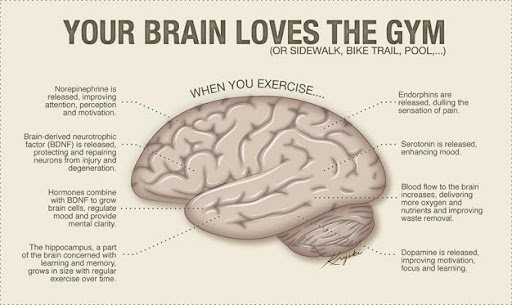Exercise and your Brain Chemistry – by Jack Connelly (Roar Physiotherapist)
It’s currently peak study season and any of the Uni students reading this will be undergoing large amounts of stress, as well as cramming a tonne of knowledge into their overflowing brains. So, I thought I would try to help you justify a much-needed study break!
We’re all aware of the physical benefits of exercise. They have been told to us time and time again. However, have you ever considered the more subtle benefits of exercise? Not talking about Instagram post’s getting more ‘likes’ either.
I wanted to go over a few of the chemical benefits of exercise on the body and brain! Please don’t leave just yet, I swear it’s interesting.
There is a highly important structure with the human brain called the hippocampus. It is responsible primarily for the formation of memories. Unfortunately, the hippocampus is particularly susceptible to degenerative diseases, such as dementia. However, cardiovascular exercise, AKA getting your heart rate up, in combination with cognitive challenges can reverse these changes as well as increase the size of the hippocampus!
Here are some of the chemicals you can expect to occur when you exercise;
Dopamine: Essential for movement and is released as positive reinforcement
Gamma Aminobutyric Acid (GABA): Essential in managing anxiety and mood
Serotonin: Helps to lower stress and anxiety as well as improve mood and self-esteem
Brain-Derived Neurotrophic Factor (BDNF): Acts like fertiliser to aid in the growth of nerve cells. Vital in the development of new nerves cells
Fibroblast Growth Factor (FGF-2): A part of the process of stem cell division which is necessary for neurogenesis
Vascular Endothelial Growth Factor (VEGF): Contributor to new blood vessel growth. Also involved in memory formation
Atrial Natriuretic Peptide (ANP): Reduces the chemical reactions associated with the flight/fight response (lowers stress)
Human Growth Hormone (HGH): Important in growth & function of brain cells, can reduce natural cell death from the aging process
Insulin-Like Growth Factor (IGF-1): Works in process of cell growth
The best thing about exercise is it provides all the essential chemicals to your brain and body without any measuring, attention to details or even conscious thought. You just have to do the work. But how much work exactly? This part depends on your age.
If you are in the 5–17-year age category, 60 minutes of moderate to vigorous exercise daily. If you’re 18 to 64 you’d be looking at around 150 minutes of moderate exercise, 75 minutes of vigorous intensity exercise, or a combination of either, per week. For increased benefit the World Health Organisation recommends aiming for double this amount, plus 2 or more resistance exercise sessions a week. The same applies if you’re 65 years or older.
We hope this has given you a brief insight into the numerous other health benefits of exercise. Go get moving and get those brain chemicals flowing!


